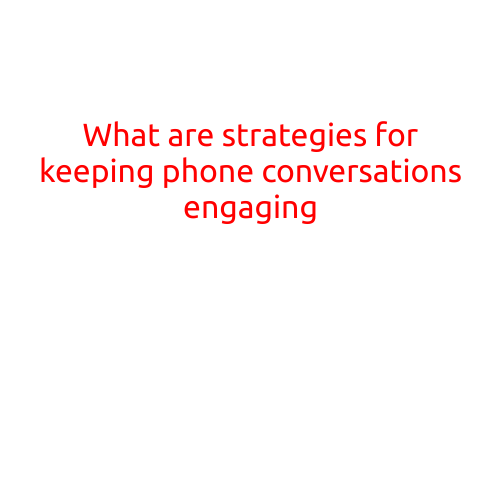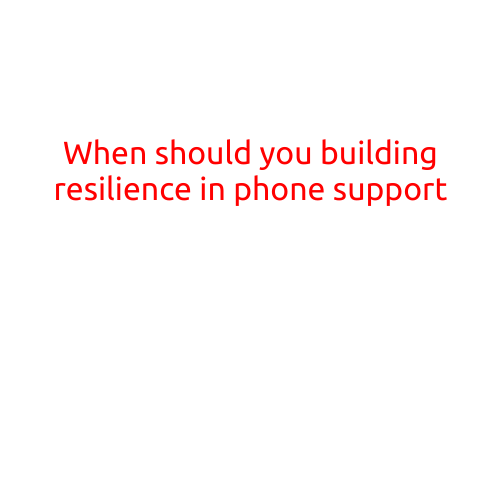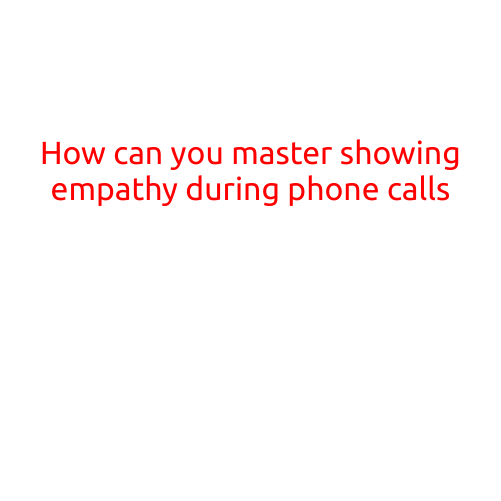
What are Strategies for Keeping Phone Conversations Engaging?
In today’s digital age, phone conversations have become a crucial aspect of our professional and personal lives. Effective phone conversations can lead to successful relationships, deals, and even career advancements. However, with the rise of email, text messaging, and video conferencing, many people are finding it increasingly challenging to keep phone conversations engaging.
Breakthroughs in technology have created new avenues for communication, but they also require adaptability and skill. Phone conversations require a delicate balance of formal and informal elements, making it essential to have effective strategies to keep conversations engaging. In this article, we will explore some strategies to help you keep your phone conversations engaging and productive.
1. Start with a Strong Opening
The first few seconds of the conversation set the tone for the entire call. Starting with a strong opening can make a significant difference. Here are a few tips:
- Begin with a friendly greeting and a brief introduction to establish a connection.
- Show enthusiasm and interest in the person or topic at hand.
- Use a conversational tone to create a relaxed atmosphere.
2. Listen Actively
Listening is often considered an undervalued skill, but it is essential for keeping phone conversations engaging. Here are some tips to help you listen actively:
- Give the speaker your undivided attention.
- Maintain eye contact (as much as possible).
- Avoid interrupting, even if you think you know what the person is going to say.
- Paraphrase and summarize what the person has said to show you’re actively listening.
3. Prepare an Agenda
Before making a call, it’s essential to have a clear idea of what you want to discuss and what you hope to achieve. Here are some tips:
- Make a list of key points you want to cover.
- Prioritize the most important topics.
- Keep the conversation focused by asking targeted questions.
4. Use Open-Ended Questions
Open-ended questions are an excellent way to encourage conversation and demonstrate your interest in the person or topic at hand. Here are some tips:
- Ask questions that begin with “what,” “how,” or “why.”
- Avoid leading questions or ones that can be answered with a simple “yes” or “no.”
- Encourage storytelling by asking follow-up questions.
5. Show Empathy and Understanding
Phone conversations often involve discussing sensitive or difficult topics. Showing empathy and understanding can help to build trust and keep the conversation engaging. Here are some tips:
- Acknowledge the person’s feelings and concerns.
- Show that you’re genuinely interested in their perspective.
- Offer support and resources if necessary.
6. Vary Your Tone and Pace
Varying your tone and pace can help keep the conversation engaging and prevent monotony. Here are some tips:
- Vary your tone to convey emotion and enthusiasm.
- Pause occasionally to allow the other person to speak.
- Avoid rambling or dominating the conversation.
7. Wrap Up Effectively
closing a phone conversation can be just as important as starting it. Here are some tips:
- Summarize the key points discussed.
- Reiterate any agreements or actions items.
- Thank the person for their time and end the conversation on a positive note.
In conclusion, keeping phone conversations engaging requires a combination of effective communication skills, active listening, and strategic planning. By implementing the strategies outlined above, you can build strong relationships, achieve your goals, and make the most of your phone conversations. Remember, phone conversations are a powerful tool, and with practice and persistence, you can master the art of keeping them engaging and effective.





